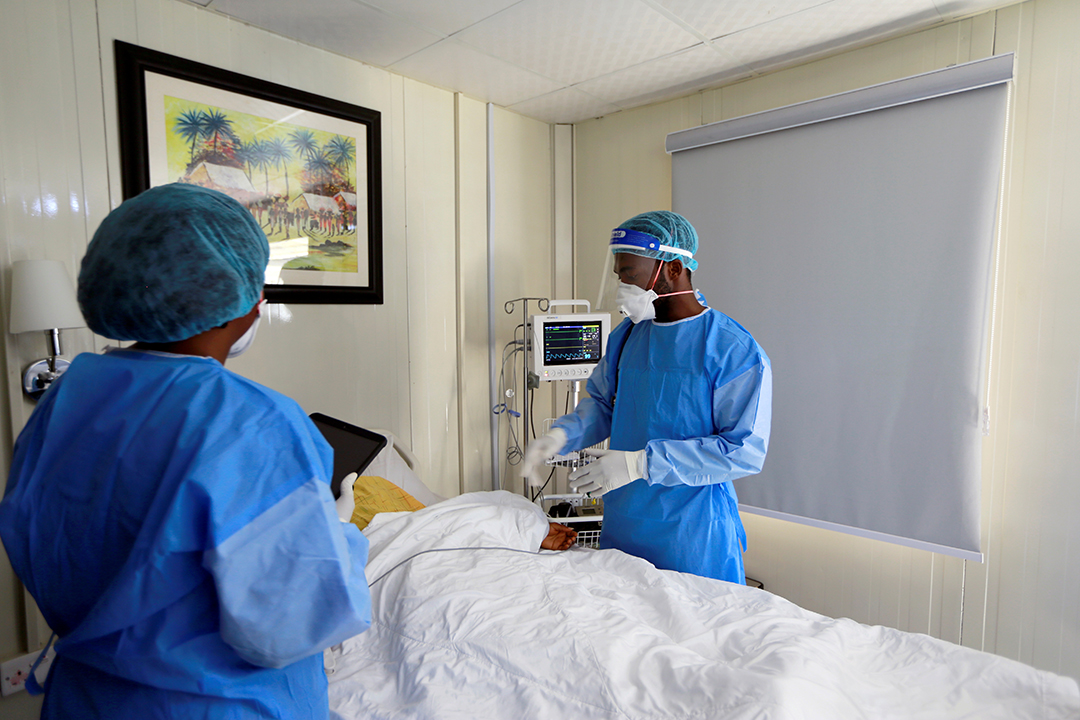African Union Plan Seeks to Train Thousands of New Medical Workers
ADF STAFF
Community health worker Mariam Traoré spends her days going door to door in Yirimadio, just outside Bamako, Mali, treating her neighbors for everything from malaria to diarrhea and even providing immunizations. On days when she can’t visit, some patients come to her.
Traoré belongs to the network of community health care workers (CHCW) serving on the frontlines of Africa’s health care system. Like her fellow community health care workers, Traoré is overstretched and needs support.
The World Health Organization estimates Africa needs 2 million community health workers to meet the demands of its rapidly growing population. A shortage of community health care workers is just one part of Africa’s medical shortfalls. On average, the continent has about 1 doctor for every 3,000 patients, about one-third the ratio the World Health Organization recommends. It also has about one-third of the 6,000 epidemiologists the population needs, according to experts.
“If we really want to be prepared for the next pandemic, we really need to expand that,” Dr. John Nkengasong, director of the Africa Centres for Disease Control and Prevention (CDC) said during a recent news briefing.
To confront Africa’s shortage of health workers, the African Union recently launched the Health Workforce Task Team with the goal of rapidly expanding the ranks of medical personnel. The unprecedented effort seeks to attract billions of dollars in funding to train thousands of new health care workers and help Africa close the gap.
The team has a lot of work ahead of it. Sub-Saharan Africa has about 145,000 doctors for a population of 821 million — a ratio of 18 doctors per 100,000 residents, according to a study by researchers at George Washington University. At the level of individual countries, the ratio can range from Niger, with fewer than 4doctors per 100,000 residents, to South Africa, with 80 per 100,000, according to the United Nations.
“A health system is not a health system without health workers. But Africa has remained short-changed on the numbers, the training, the skills training, the available of health workers across the continent,” said Dr. Githinji Gitahi, CEO of Amref Health Africa in a video in early April. “This must be addressed if we are going to be ready for universal health coverage and also ready for the next pandemic.”
Expanding Africa’s health care workforce is a key part of its economic, social, and political recovery from the pandemic, Gitahi said.
Across Africa, the lack of health care workers on the frontlines of the pandemic pushed already fragile health systems to the breaking point. With little personal protective equipment in the beginning, health care workers were among the pandemic’s earliest victims.
Long before COVID-19 appeared, however, Africa was losing doctors. The continent has suffered a health care brain drain for many years as thousands of African-trained doctors leave their home countries for higher wages and better facilities abroad. The doctors who remain face an increasing burden of patients.
The WHO estimates that Africa needs more than 1 million doctors to meet international standards. In sub-Saharan Africa, for example, 169 medical schools graduate about 10,000 doctors each year, a small number of each given the population, according to a study by George Washington University.
As Africa recovers from COVID-19, leaders can use the power of the Africa CDC and Africa Union to build stronger, more resilient health care systems, Gitahi wrote in a joint letter with Nkengasong and other public health experts. Doing so will improve lives and livelihoods, they wrote.
“Beyond the tremendous setbacks of Covid, there is well-documented data that consistently link health to development, education, economic growth and wellbeing,” the authors wrote. “As we look to the horizon past Covid, we must not just build back better. We must build back better transformatively.”


Comments are closed.